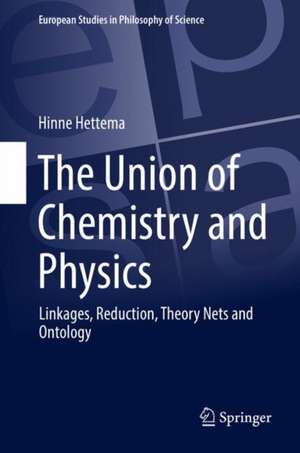The Union of Chemistry and Physics: Linkages, Reduction, Theory Nets and Ontology: European Studies in Philosophy of Science, cartea 7
Autor Hinne Hettemaen Limba Engleză Hardback – 9 aug 2017
The starting point of this book is that there is at least a form of unity between chemistry and physics, where the reduction relation is conceived as a special case of this unity. However, matters are never concluded so simply within philosophy of chemistry, as significant problems exist around a number of core chemical ideas. Specifically, one cannot take the obvious success of quantum theories as outright support for a reductive relationship. Instead, in the context of a suitably adapted Nagelian framework for reduction, modern chemistry's relationship to physics is constitutive. The results provided by quantum chemistry, in partic
ular, have significant consequences for chemical ontology. This book is ideal for students, scholars and academics from the field of Philosophy of Science, and particularly for those with an interest in Philosophy of Chemistry and Physics.
| Toate formatele și edițiile | Preț | Express |
|---|---|---|
| Paperback (1) | 641.20 lei 43-57 zile | |
| Springer International Publishing – 12 mai 2018 | 641.20 lei 43-57 zile | |
| Hardback (1) | 647.40 lei 43-57 zile | |
| Springer International Publishing – 9 aug 2017 | 647.40 lei 43-57 zile |
Preț: 647.40 lei
Preț vechi: 761.65 lei
-15% Nou
Puncte Express: 971
Preț estimativ în valută:
123.88€ • 129.67$ • 103.11£
123.88€ • 129.67$ • 103.11£
Carte tipărită la comandă
Livrare economică 31 martie-14 aprilie
Preluare comenzi: 021 569.72.76
Specificații
ISBN-13: 9783319609096
ISBN-10: 3319609092
Pagini: 340
Ilustrații: XV, 295 p. 19 illus.
Dimensiuni: 155 x 235 x 28 mm
Greutate: 0.61 kg
Ediția:1st ed. 2017
Editura: Springer International Publishing
Colecția Springer
Seria European Studies in Philosophy of Science
Locul publicării:Cham, Switzerland
ISBN-10: 3319609092
Pagini: 340
Ilustrații: XV, 295 p. 19 illus.
Dimensiuni: 155 x 235 x 28 mm
Greutate: 0.61 kg
Ediția:1st ed. 2017
Editura: Springer International Publishing
Colecția Springer
Seria European Studies in Philosophy of Science
Locul publicării:Cham, Switzerland
Cuprins
1: Reduction: a model for the reduction of chemistry to physics.- Part I Explanatory Limits.- 2 Explaining the Chemical Bond: Idealisation and Concretisation.- 3 Molecular Structure: What Philosophers got wrong.- 4 The Theory of Absolute Reaction Rates.- 5 Quantum chemistry as a Research Programme.- Part II Formal Models.- 6 Reduction between structures: some issues and a proposal.- 7 Models for Quantum Chemistry.- 8 Reduction with Structures: Two examples.- Part III Ontological consequences.- 9 Orbitals and Ontology in the Philosophy of Chemistry.- 10 The ontology of chemistry.
Notă biografică
Hinne Hettema is associated with the University of Auckland. He studied Chemistry and Philosophy at the Rijksuniversiteit Groningen, completing a PhD in 1993 (Chemistry) and 2012 (Philosophy). He is one of the authors of the Dalton quantum chemistry package.
Textul de pe ultima copertă
This monograph deals with the interrelationship between chemistry and physics, and especially the role played by quantum chemistry as a theory in between these two disciplines. The author uses structuralist approach to explore the overlap between the two sciences, looking at their theoretical and ontological borrowings as well as their continuity.
The starting point of this book is that there is at least a form of unity between chemistry and physics, where the reduction relation is conceived as a special case of this unity. However, matters are never concluded so simply within philosophy of chemistry, as significant problems exist around a number of core chemical ideas. Specifically, one cannot take the obvious success of quantum theories as outright support for a reductive relationship. Instead, in the context of a suitably adapted Nagelian framework for reduction, modern chemistry's relationship to physics is constitutive. The results provided by quantum chemistry, in partic
ular, have significant consequences for chemical ontology. This book is ideal for students, scholars and academics from the field of Philosophy of Science, and particularly for those with an interest in Philosophy of Chemistry and Physics.
The starting point of this book is that there is at least a form of unity between chemistry and physics, where the reduction relation is conceived as a special case of this unity. However, matters are never concluded so simply within philosophy of chemistry, as significant problems exist around a number of core chemical ideas. Specifically, one cannot take the obvious success of quantum theories as outright support for a reductive relationship. Instead, in the context of a suitably adapted Nagelian framework for reduction, modern chemistry's relationship to physics is constitutive. The results provided by quantum chemistry, in partic
ular, have significant consequences for chemical ontology. This book is ideal for students, scholars and academics from the field of Philosophy of Science, and particularly for those with an interest in Philosophy of Chemistry and Physics.
Caracteristici
Revisits and contradicts arguments supported by early philosophers of chemistry Uses a structuralist approach to study the relationship between physics and chemistry Studies the ontological consequences of quantum chemistry












